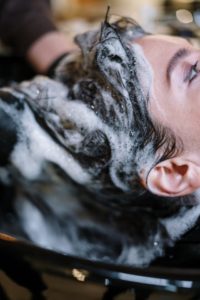 Many people desire shiny hair and a healthy scalp. However, a common obstacle to achieving this is dandruff. Dandruff not only affects one’s appearance but can also lower self-confidence.
Many people desire shiny hair and a healthy scalp. However, a common obstacle to achieving this is dandruff. Dandruff not only affects one’s appearance but can also lower self-confidence.
Dandruff typically appears as white flakes and is caused by the excessive shedding of dead skin cells on the scalp. This condition leads to scalp dryness, resulting in irritation and discomfort. In addition to the common dandruff problem that affects most people, there are also those who suffer from chronic skin conditions, characterised by abnormal flaky skin on the scalp, such as seborrhoea and psoriasis.
Seborrhoea is an inflammatory scalp condition marked by the accumulation of thicker, yellowish, greasy flakes. Conversely, psoriasis is characterised by an unusual increase in scalp cell production, resulting in a reddened, thickened, scaly scalp with the formation of silver flakes.
Causes of Dandruff
The exact cause of dandruff is unclear; however, evidence suggests a possible link between dandruff and a fungal infection by the Malassezia species. This fungus commonly inhabits the scalps of most adults without causing harm. However, research shows that individuals with dandruff often have a higher prevalence of Malassezia, suggesting that it plays a role in dandruff formation.
Dandruff is often seen in people who neglect personal hygiene, particularly hair care. Excessive oiliness on the scalp increases the production of dead skin cells. Other contributing factors include sensitivity to hair care products, stress, hormone imbalances, and poor nutrition.
Preventing Dandruff
To prevent dandruff, frequent hair washing is recommended to remove excess oil from the scalp. Anti-dandruff shampoos containing menthol are effective in relieving scalp itching. Additionally, those suffering from dandruff should limit the use of hair dryers, manage stress effectively, and maintain a balanced, nutritious diet. Consuming foods rich in B vitamins—such as fish, whole grains, egg yolks, bananas, green vegetables, and legumes—can help promote a healthy scalp.
Treatment for Chronic Dandruff
 Dandruff is generally treatable with anti-dandruff products. These products reduce dead skin cell shedding, relieve itching, slow skin cell overgrowth, and inhibit fungal growth on the scalp.
Dandruff is generally treatable with anti-dandruff products. These products reduce dead skin cell shedding, relieve itching, slow skin cell overgrowth, and inhibit fungal growth on the scalp.
- Selenium Sulphide Shampoo: This active ingredient suppresses scalp cell growth and has antifungal properties. It is recommended for use once or twice a week during the initial phase of treatment, followed by use as needed. Care should be taken to avoid contact with the eyes, nose, mouth, or broken skin.
- Coal Tar Shampoo: Coal tar slows the proliferation of scalp cells but may cause irritation, scalp staining, and changes in hair colour. After use, it is important to rinse thoroughly, and application frequency should follow a doctor’s guidance.
- Ketoconazole Shampoo: Ketoconazole is an antifungal agent that helps inhibit fungal growth contributing to dandruff. It should be applied evenly, left on for 3-5 minutes, and then rinsed thoroughly. It is typically used twice a week for 2-4 weeks, with a minimum 3-day interval between uses.
- Salicylic Acid Preparations: Salicylic acid helps remove dandruff from the scalp but can cause dryness. It should be used as directed by a doctor or pharmacist to minimise side effects.
Alternative Treatments
Patients may also explore alternative treatments, such as shampoos enriched with tea tree oil, which has been shown to reduce dandruff and relieve scalp itching. Other natural remedies, including bergamot, garlic, thyme, and peppermint oil, may also promote a healthy scalp.
Advice for Patients and the Public
While anti-dandruff products can address common dandruff issues, individuals should seek medical advice if the problem persists or worsens. A thorough assessment by a doctor is crucial to identify the underlying cause of the dandruff. Patients are also encouraged to consult pharmacists for guidance on the correct use of anti-dandruff products to maximise effectiveness and avoid side effects.
Preventing dandruff can be achieved through consistent preventive measures and proper use of anti-dandruff products. Treating dandruff is essential not only for improving one’s appearance but also for boosting self-confidence.
If there are any inquiries regarding medicines, please call the National Pharmacy Call Centre (NPCC) at the toll-free number 1-800-88-6722 during weekdays from 8 a.m. to 5 p.m., except on public holidays.

This article is written by Mohd Shahiri bin Abd Ghapar, a pharmacist at Pharmacy Practice and Development Division, Ministry of Health for Bahagian Amalan dan Perkembangan Farmasi (BAPF), KKM x The Malaysian Medical Gazette Series. It is hoped that this collaboration will help prpogate information regarding medication to the general public.
References:
Shuster, S. (1984). The aetiology of dandruff and the mode of action of therapeutic agents. British Journal of Dermatology, 111(2), 235-242.
Satchell, A. C., Saurajen, A., Bell, C., & Barnetson, R. S. (2002). Treatment of dandruff with 5% tea tree oil shampoo. Journal of the American Academy of Dermatology, 47(6), 852-855.
https://pharmacy.moh.gov.my/en/apps/fukkm?generic=&category=&indications=dandruff
https://pharmacy.moh.gov.my/sites/default/files/document-upload/poisons-list-pua-306.2023-18.10.2023_2.pdf
https://www.healthline.com/health/tea-tree-oil-for-dandruff
https://lavendertips.com/the-benefits-of-lavender-for-treating-dandruff-a-natural-remedy/#:~:text=Lavender%20is%20a%20natural%20substance%20that%20relieves%20stress,your%20scalp%2C%20as%20well%20as%20to%20combat%20dandruff.
https://www.womenshealthmag.com/beauty/a41902382/rosemary-oil-for-hair/
